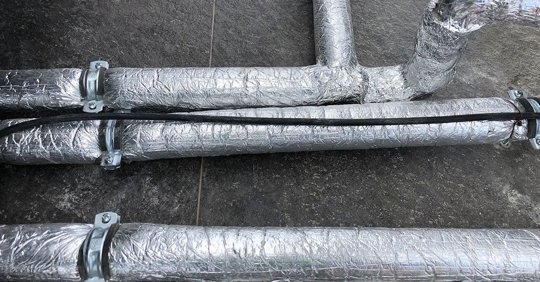As the temperature outside begins to dip, your pipes are at a much higher risk of freezing and bursting. This can result in significant damage to your piping, plumbing, and furnace, as well as water damage to your home interior. To avoid these costly repairs, learn how to prevent your water pipes from freezing by following these steps.
How to Prepare Pipes for Freezing Weather
Fluctuations in temperature and even poor insulation can lead to frozen pipes in and around your home. So, while it may seem only necessary to prep your exterior piping, your exposed interior pipes can be just as likely to freeze.
Here are some of the most helpful tips on how to prevent pipes from freezing:
- Insulate your pipes. Pipe insulation comes in many affordable options and is easy to install—making it one of the best ways to keep your pipes protected during the colder months. This added insulation will help prevent condensation and reduce heat loss.
- Install heat cables or heat tape. Like pipe insulation, heat cables or tape wrapped directly around your piping will help keep the water above freezing temperatures. This option, however, requires an outlet to plug in, which may not be ideal for all water pipes in and around your home. In this case, you may want to use both insulation and cables in separate locations. It’s not recommended to layer insulation on top of cable-wrapped pipes, though, as it may cause overheating.
- Weatherproof your home. According to the EPA, air leaks in your home can account for up to 40% of the energy used to heat and cool your home. Not only is this wasted energy not being used to keep your pipes well-heated, but it also leaves your pipes more vulnerable to cold drafts. Weatherstripping the areas prone to air leaks such as windows and doors can make a huge difference in this heat loss, and better protect your pipes.
- Open doors and cabinets. For piping that’s located in closed-off spaces, opening doors and cabinets can help increase warm airflow into those areas and therefore prevent frozen pipes.
- Disconnect your exterior hoses. Fully draining and disconnecting your exterior hoses will help prevent any trapped water from freezing and causing a burst pipe.
- Keep a consistent thermostat temperature. Frequently adjusting your thermostat not only leaves your pipes more susceptible to freezing at night, but it also puts more strain on your furnace which can affect its overall efficiency. During the coldest months, make sure you’re keeping a consistent temperature above 55 degrees Fahrenheit.
- Service your heater regularly. If your heating system is inconsistent or inefficient, then your plumbing will suffer too. Make sure your heater is regularly inspected to avoid unexpected breakdowns or slowed efficiency during the colder months.
- Add wall insulation. The better long-term solution to preventing pipes from freezing is by improving your home’s insulation. Specifically, adding insulation to areas like your attic, basement, and crawlspace that are unlikely well-heated will help keep your pipes better protected against the cold.
Related Content: Reasons to Install an Automatic Water Shut-off Valve
What to Do if Your Pipes Are Frozen
A frozen pipe won’t always result in a burst pipe. Depending on the situation, there are a few steps you can follow to prevent any further damage.
For frozen pipes:
- Leave your faucets turned on. If you turn on your faucets and only a slight trickle of water comes out, one or more pipes are likely frozen. Leaving your faucets on will allow water to flow once it thaws.
- Locate frozen areas. If only a small area of your piping has frozen, you’ll likely be able to safely (and slowly) thaw it. If, however, you notice several pipes frozen, it’s best to call an expert for help to prevent further damage or bursting.
- Slowly apply heat to the frozen area. You can attempt to slowly thaw the frozen area of your pipe by wrapping heated towels or a heating pad around it or using an electric hair dryer or a space heater at a safe distance. NEVER use an open flame to thaw a pipe.
- Call a plumber. Thawing frozen pipes incorrectly can lead to far more damage. If several pipes have frozen, you’re uncertain about thawing them on your own, or you cannot locate or reach the frozen pipe(s), call an expert to properly handle the situation.
For leaks or burst pipes:
- Turn off your main water line. The pressure of flowing water against patches of ice is what causes your pipes to eventually burst. Turning off the water line will stop your pipes from leaking any additional water and help prevent other pipes from bursting.
- Call a plumber. A leaking or burst pipe requires immediate, professional attention. Call our experts at Assured Comfort for plumbing repair services.
- Leave your faucets on. Unless otherwise instructed by your plumber, leave your faucets open to help thawing water flow out and prevent pressure buildup from bursting any additional pipes.
Burst Pipes? Call Your Local Atlanta Plumbers
Burst pipes can lead to considerable damage without emergency repair. Located in Atlanta and Marietta, GA, our plumbers at Assured Comfort can provide you with quick, reliable repair service. Call us at 770-464-5745[OUW6] , or contact us online for additional winter pipe preparation.

